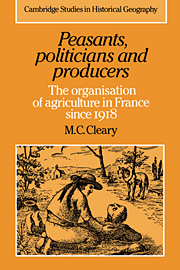Book contents
- Frontmatter
- Contents
- List of figures
- List of tables
- Preface
- Abbreviations
- Base map of the départements of France
- Introduction
- 1 The transformation of rural France
- 2 Individuals and associations in the farming community
- 3 Agricultural associations before 1914
- 4 The heyday of the regional unions, 1918–1930
- 5 The economic crisis and the rise of corporatism, 1930–1940
- 6 Agricultural associations under Vichy, 1940–1944
- 7 A rural revolution? Syndicates and cooperatives, 1944–1965
- 8 The deceptions of progress, 1965–1985
- 9 Representing the community – the place of salaried labour and women
- 10 Conclusion
- Notes
- Bibliography
- Index
1 - The transformation of rural France
Published online by Cambridge University Press: 28 October 2009
- Frontmatter
- Contents
- List of figures
- List of tables
- Preface
- Abbreviations
- Base map of the départements of France
- Introduction
- 1 The transformation of rural France
- 2 Individuals and associations in the farming community
- 3 Agricultural associations before 1914
- 4 The heyday of the regional unions, 1918–1930
- 5 The economic crisis and the rise of corporatism, 1930–1940
- 6 Agricultural associations under Vichy, 1940–1944
- 7 A rural revolution? Syndicates and cooperatives, 1944–1965
- 8 The deceptions of progress, 1965–1985
- 9 Representing the community – the place of salaried labour and women
- 10 Conclusion
- Notes
- Bibliography
- Index
Summary
On the eve of the First World War France was dominated by a rural and agricultural ethos. The strength of its agricultural traditions, the powerful and often contradictory images that surrounded its peasant population, and the force of its agricultural lobby, continued to exert an influence at odds with the newly urbanising and industrialising nation. And, whilst the conquest and colonisation of peasant by urban France was accelerating to an ineluctable and, to some contemporaries, alarming degree, the dominance of the agricultural ethos remained. The myth of the peasant as the cornerstone of the nation, strong in 1914, was reinforced by the horrors of the war, in whose trenches so many peasants died.
If peasant culture in France has had perhaps one of the longest of all death-knells, with a periodic tocsin heralding its demise since at least the early nineteenth century, the changes in agricultural life since 1918 have nonetheless been profound and deep-seated. Social transformations accentuated by the rural exodus, revolutions in farming techniques and productivity, and changes in the mentalities and genre de vie of peasants have irrevocably altered the structures and geography of rural France. Farms are now larger in size and smaller in number. Technical changes and the expansion of the market have changed peasant into producer. New forms of sociability have replaced the older fabric of fair and veillée. Distances between farms are now measured in hours, not days.
- Type
- Chapter
- Information
- Peasants, Politicians and ProducersThe Organisation of Agriculture in France since 1918, pp. 5 - 20Publisher: Cambridge University PressPrint publication year: 1989
- 1
- Cited by



